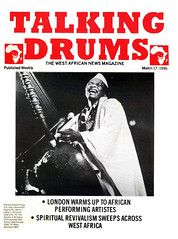Letters
Rawlings' weight
Obesity appears to be a worrying problem for Ghana's heads of state. The wife of a former president of Ghana once told the nation in a publication in a local daily newspaper that her husband liked palm soup and 'nkontomire' (Spinach) very much, apparently to forestall gossip about prosperity and chopping' in case the president started putting on weight.Flt-Lt. Rawlings, leader of the 'revolution', is reported to have explained to the world the reason why he has put on weight. During the opening of the congress of the African Trades Union Unity (OATUU) on February 6, 1986, in Accra, he said that he had drastically cut down the number of cigarettes which he smokes, and no longer inhaled the smoke at all. He added that the advice was given to him in China during his visit six months ago (Talking Drums, February 24, 1986).
In Cape Coast, Sekondi and Makola markets in Ghana, there are prosperous traders who are very fat. If a reduction in or abstinence from smoking can induce obesity according to Chairman Rawlings' prescription from China, why is it that the workers, light smokers and non-smokers, keep on losing weight?
After four years of progressive devalua- tion on cumulative basis for a 'trans- Atlantic' economic recovery programme in Ghana which has now ended without any recovery in the country, the people of Ghana are no longer tightening their belts, because there is virtually no abdomen for the purpose, yet the 'revolutionaries' have sir been putting on weight in arithmetic progression.
In line with the PNDC's policy of 'conscientizing the people', I think it would have been logical if Rawlings had rather said that he ate 'waakyi' (mixed rice and beans) or 'yokegarri' (garri and beans) very often to increase his weight, as his reason for the development of obesity is ludicrous.
The end of a professional magician finally comes when his spirits abruptly abandon him. He then runs away from the stage to avoid being beaten up by the spectators for deception as nothing happens by his incantations, no matter how loud he conjures.
The PNDC members and their cohorts are currently seeing the demise of their 'revolution' and are terribly agitated. In a situation like this people are driven to resort to foolish antics that deceive no one. Kwesi Hammond, Amman, Jordan
Show of toughness?
The news of the execution of ten military men convicted of conspiracy to overthrow the AFRC in Lagos last week March 5, 1986, came as a great shock to me and, I am sure, many Nigerians, especially considering the fact that the tribunal which tried them hardly had the ink dry on the judgement paper and the appeals were yet to be heard.The haste in which the executions were carried out suggests that the AFRC wanted to get them out of the way before international pressures for clemency began to flood in.
And yet General Babangida is well- known for his genial smile that some people had mistaken for lack of resolute- ness and firmness. In this context I think your COMMENT (March 10, 1986) headed "The contradictory smile" was very prophetic as the president has unequivocally proved that even though he is prepared to allow debate on all issues affecting the welfare of the state and relax the draconian decrees imposed by the previous regime, when the security of his own government is threatened from within or without, he takes the final decisions and acts swiftly. Salami Ajuko, London
More than meets the eyes
Re: Educating Ghanaian children in Cuba: countering some popular misconceptions. I have read the article by Mr Emmanuel A. Annor carefully and congratulate him for his well-researched piece on the Cuban education system.However, without holding any brief for Mrs Owusu-Appiah of Germany, whose original letter provoked the reply, I still hold the view that there are quite a number of things wrong with sending hundreds of children to Cuba, the economic situation prevailing at the time notwithstanding. For one thing, the selection of these children was not competitive in the sense that no examinations were conducted to ensure that the material was of good quality. One can imagine the problem this may cause in the future when, like SOME of the Eastern-trained Ghanaians in the 60's who got scholarships because of their parent's party connections, they faced problems on their return home.
Secondly, if the Cuba education is as good as Mr Annor claims it is, why is it that a separate school has been set up for them instead of mixing with regular Cuban children? These and many other question marks over the whole project lead some of us to think that the government accepted the offer with the knowledge that the children are in Cuba for something more than academic pursuit.
James Aduhene, Chingford, London
